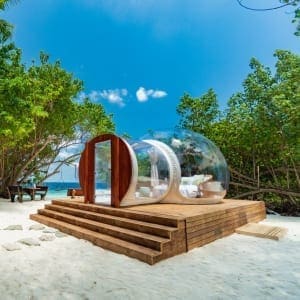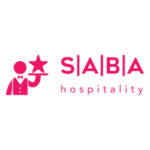
As yet another problem that hoteliers have to reckon with during this pandemic, we must figure out how to deliver exceptional service to our guests without any significant degree of face-to-face contact. In the antecovidian times, so much of what encompassed service was high-touch – getting up close with customers to make them feel special. Now that this time-honored practice is anathema, how can properties adapt? How do we remain high-touch while acting in a no-touch manner?
Particularly at the luxury end where hotels pride themselves on their staff-to-guest ratios, we must look to those organizations at the very top for guidance through this oxymoronic dilemma. As the Canadian ambassador for Small Luxury Hotels of the World, I had the chance to work with Filip Boyen who was its CEO at the time before he joined Forbes Travel Guide (FTG) as its current CEO in 2018. In the following interview, we look to this enforcer of five-star brand standards and its brilliant Belgian leader for advice during these dark days of COVID-19.
FTG not only provides leadership for hoteliers around the world but acts as an incredible resource for travelers. How has the B2C focus shifted with the cessation of international travel?
When the pandemic struck, our editorial team pivoted to spotlight virtual travel experiences, from beach tours in Palm Beach to online exercise classes with trainers from One&Only Le Saint Géran in Mauritius. We’ve also kept readers informed on luxury hotel reopenings, which destinations were welcoming travelers as well as what to expect at hotels, restaurants and spas in this new era. In addition, the team has covered COVID-19 travel trends, including workcations, the surge in demand for villas and creative F&B offerings – from elaborate meals in repurposed ski gondolas to takeaway hotel afternoon teas.
As people stay close to home, we aim to provide travel inspiration for brighter days ahead via our Instagram account, @ForbesTravelGuide, as well as stories that showcase stunning hotel gardens or island getaways, for example. We hope to give people an escape through photos or stories, even if it’s just for a few minutes.
FTG’s Five-Star represents perhaps the pinnacle of brand standard guidelines for hotels. Beyond a newfound emphasis on sanitization, what are some ways that these have evolved since the pandemic?
During the early days of the pandemic, it became clear to us we needed to add some flexibility to the way we assessed the properties that were still open. Many were operating but under local and government-level health mandates, and those all varied quite broadly. So, over the spring and summer, we released a complete list of service concessions and allowances, such as suspending the mandatory requirement to offer evening housekeeping service.
We also developed a set of best practices to support hotels in how to adapt to their modifications but still keep guest service top of mind. As the months went on, we began working on our annual standards changes for 2021. This set of standards was delivered a few weeks ago to the hotels that are part of our Global Partnership program.
In addition to maintaining some of the concessions we made over the summer, we introduced new requirements that are a reflection of how we are seeing luxury rapidly evolve in the wake of COVID-19. This includes a brand-new classification with standards all focused on wellness. They run throughout the hotel, restaurant and spa award evaluations in response to how we are seeing more and more guests embrace the need to live well when they are away from home. FTG has always had standards reflecting the opportunity to maintain a healthy lifestyle when traveling, but we really dug deep and have standards that seek out when hotels are investing in amenities and services that enhance anything from the quality of your sleep to the overall sense of wellbeing the guest has, along with access to water, fresh air and activities that promote a strong sense of health security.
Can a hotel maintain a personalized, high-touch relationship with technology replacements?
We believe so. FTG has a dedicated digital services set of standards that specifically looks at how properties integrate technology – including prearrival, on-property and post-stay – to increase efficiency and communication, and now that same technology also saves a trip to a desk for an in-person interaction. But at the same time, when done well, service does not lose the sense of personalization. It is certainly a balance, and luxury is still about giving the guest choices, even if some of those options are different than they were pre-pandemic.
How can hotels better utilize FTG to help bring back stagnant market segments?
The best way for properties to bring back any market segment is to instill guest confidence. To that end, we partnered with digital health company Sharecare to develop a health security verification solution that enables hotels to amplify existing safety protocols and comply with expert-validated best practices to minimize the risk and impact of acute public health events. Upon successfully validating their status, hotels earn a VERIFIED health security badge. This recognizable certification from an impartial third party assures guests and travel advisers that the property is safe.
This tool will be the gold standard in the hospitality industry. Internova Travel Group – the parent company of Travel Leaders Network, Bonotel Exclusive Travel, Protravel International, Tzell Travel Group, Andrew Harper Travel, ALTOUR and other influential travel brands – expects all of the hotels it works with to be Sharecare Health Security VERIFIED by the end of Q1 2022.
Beyond viral safety, what other trends can influence leisure travelers to select a certain hotel?
FTG soon will release its third Leading Edge of Luxury report, a survey of more than 460 hoteliers worldwide on how properties are adapting to COVID-19. In it, respondents shared that they are seeing more bookings than usual just 24 to 48 hours in advance, as well as walk-ins. They also report seeing more families checking in along with longer stays, which make villas and other larger, private accommodations popular.
We also have seen the rise of workcations, where hotels are accommodating the new digital workforce with everything from monitors and mice to business butlers and Zoom stylists. And during the holiday season, hotels were helping people create smaller celebrations with hotel suite packages. These carefully curated offerings include everything from a private chef whipping up a multicourse meal to a socially distant philharmonic performing in a guest suite.
Whenever the pandemic ends, which trends are here to stay and which ones will fall by the wayside?
Even when the pandemic ends, health security will continue to be a vital issue. Health security is not a single event; it’s a culture of accountability, a process and part of the operation of the business. We designed the Sharecare Health Security platform as a future-proofed protection that looks beyond COVID-19. As there were more than half a dozen dangerous virus outbreaks in the last decade or so, including SARS, MERS, Zika, Ebola, H1N1, other aggressive influenza strains and more, we positioned the Health Security framework as part of a new way that organizations and economies need to manage themselves to avoid similar devastation in the future.
This article may not be reproduced without the expressed permission of the author.































